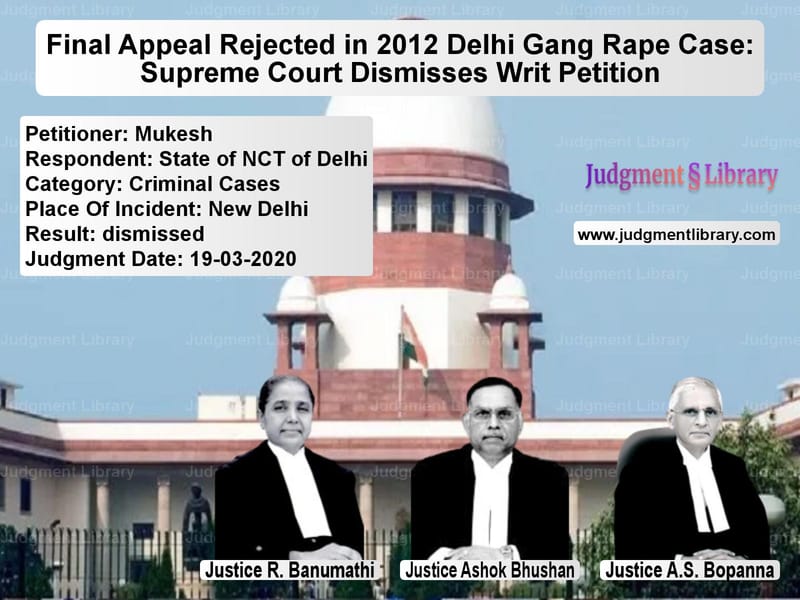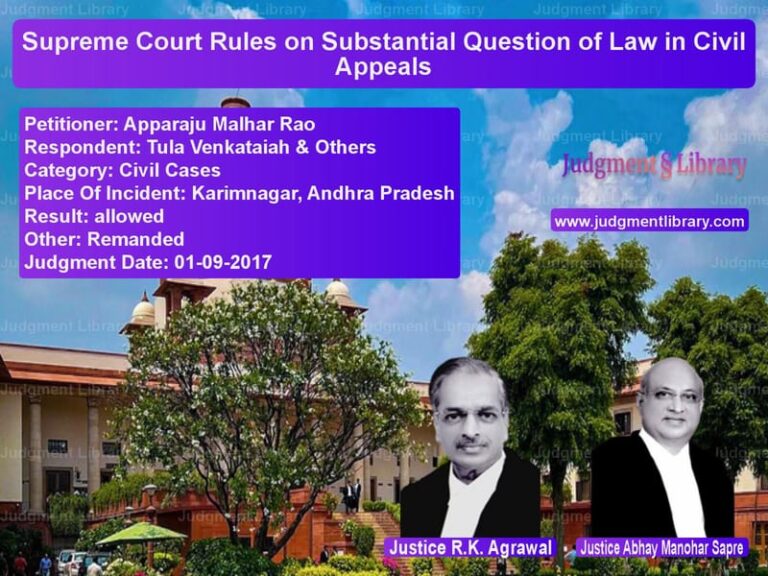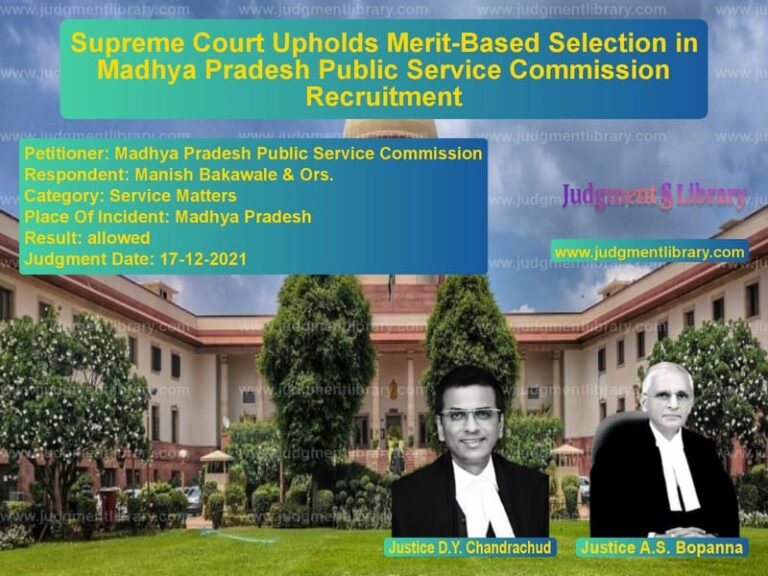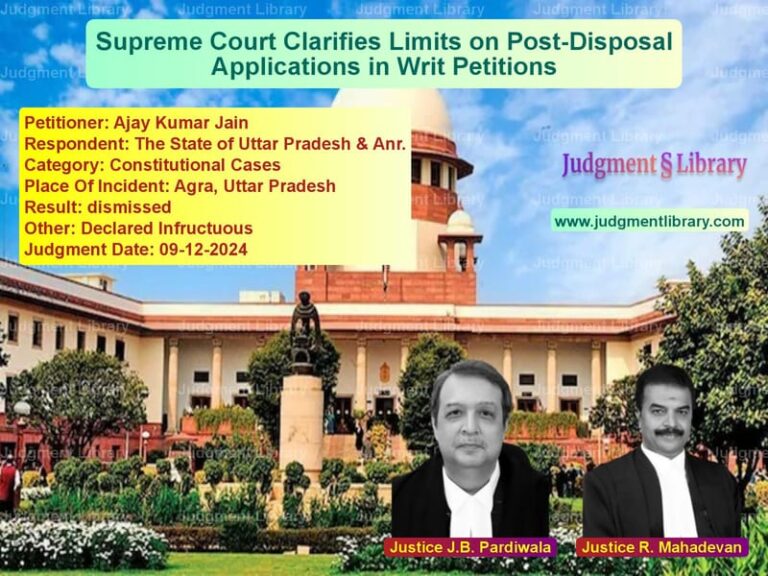Final Appeal Rejected in 2012 Delhi Gang Rape Case: Supreme Court Dismisses Writ Petition
The Supreme Court of India, in the case of Mukesh v. State of NCT of Delhi, dismissed a writ petition filed by one of the convicts in the 2012 Delhi gang rape case. The petition challenged the rejection of the convict’s mercy plea and raised multiple contentions, including issues related to evidence consideration, arrest validity, and the alleged disability of one of the accused who had committed suicide in custody.
Background of the Case
The case stems from the brutal gang rape and murder of a 23-year-old paramedical student in Delhi on December 16, 2012. The incident led to widespread protests and demands for stricter laws on crimes against women. The accused were tried under fast-track court proceedings and were convicted and sentenced to death by the trial court, which was upheld by the Delhi High Court and the Supreme Court.
Mukesh, one of the convicts, filed multiple legal remedies, including appeals, review petitions, curative petitions, and a mercy plea, all of which were rejected at various judicial levels.
Petitioner’s Arguments
The petitioner raised several key arguments in an attempt to challenge the conviction:
- “There was no proper consideration of evidence, and critical aspects were ignored in the trial.”
- “The alleged disability of Ram Singh (another accused who committed suicide in custody) was not sufficiently examined.”
- “There were doubts about the legality of Mukesh’s arrest from Karoli, Rajasthan, and the procedural fairness of the trial.”
- “His mercy petition was rejected without due application of mind by the President of India.”
Respondent’s Arguments
The State of NCT of Delhi, representing the prosecution, countered these claims with the following arguments:
- “The convict was given a fair trial at every stage, from the trial court to the Supreme Court, with ample opportunities to defend himself.”
- “All necessary procedures under the law were followed while rejecting the review petition and curative petition.”
- “The mercy petition was examined by the President of India in accordance with constitutional and legal provisions, and there was no miscarriage of justice.”
- “The convict had exhausted all possible legal remedies, and the petition was a last-minute attempt to delay the execution.”
Supreme Court’s Observations
The three-judge bench of the Supreme Court, comprising Justice R. Banumathi, Justice Ashok Bhushan, and Justice A.S. Bopanna, thoroughly reviewed the petition and made several crucial observations:
“The petitioner was afforded sufficient opportunity, and after consideration of the evidence, the petitioner has been convicted, which was upheld in appeal by the High Court and later by this Court.”
Regarding the legality of the arrest and procedural fairness, the Court stated:
“The criminal appeal filed before this Court was heard at length, and the points raised by the accused herein were considered and dismissed by the judgment of this Court dated 05.05.2017.”
On the rejection of the mercy petition, the Court held:
“The writ petition filed under Article 32 of the Constitution challenging the order of rejection of the mercy petition was also dismissed by this Court on 29.01.2020.”
Final Judgment
The Supreme Court dismissed the writ petition, finding no valid grounds to interfere with the conviction or the rejection of the mercy petition. The Court also noted that all prior legal remedies had been exhausted and that there was no procedural irregularity.
Key Takeaways
- The Supreme Court reaffirmed that judicial and executive procedures were duly followed in rejecting the convict’s appeals and mercy plea.
- The ruling set a strong precedent that frivolous petitions cannot be entertained to delay execution in cases where all legal remedies have been exhausted.
- The judgment underscored the importance of procedural justice in death penalty cases, ensuring that due process is meticulously followed.
Conclusion
The Supreme Court’s decision marks the final chapter in one of India’s most high-profile criminal cases. By dismissing the last legal challenge, the Court upheld the principle of justice while ensuring that judicial procedures were not misused for delaying executions. The ruling reinforces the need for swift and effective implementation of the rule of law in cases of heinous crimes.
Petitioner Name: Mukesh.Respondent Name: State of NCT of Delhi.Judgment By: Justice R. Banumathi, Justice Ashok Bhushan, Justice A.S. Bopanna.Place Of Incident: New Delhi.Judgment Date: 19-03-2020.
Don’t miss out on the full details! Download the complete judgment in PDF format below and gain valuable insights instantly!
Download Judgment: Mukesh vs State of NCT of Delh Supreme Court of India Judgment Dated 19-03-2020.pdf
Direct Downlaod Judgment: Direct downlaod this Judgment
See all petitions in Bail and Anticipatory Bail
See all petitions in Custodial Deaths and Police Misconduct
See all petitions in Judgment by R. Banumathi
See all petitions in Judgment by Ashok Bhushan
See all petitions in Judgment by A. S. Bopanna
See all petitions in dismissed
See all petitions in supreme court of India judgments March 2020
See all petitions in 2020 judgments
See all posts in Criminal Cases Category
See all allowed petitions in Criminal Cases Category
See all Dismissed petitions in Criminal Cases Category
See all partially allowed petitions in Criminal Cases Category







